The Different Types of Marketing Consultants
The previous chapter outlined the nature of working with a marketing consultant. However, it is worth noting that every marketing consultant and marketing consultancy is different.
Each will have a unique character and methodology, which you should be confident of being compatible with before enlisting their services.
This is where choosing a marketing consultant can be difficult. Ultimately, it is for you to find, engage and decide upon the right kind of support for your needs.
This chapter will address some of the most common types of marketing consultants. This includes marketing consultant characters and their methodologies, how to spot them, and how to identify red flags during your search.
The Most Common Types of Marketing Consultants
 Although a marketing consultancy should, by nature of their role, function in partnership with their clients, some consultants achieve this better than others. You may even find that you prefer a less partnered working relationship, depending on your business’ needs and your own personal preferences as a business owner.
Although a marketing consultancy should, by nature of their role, function in partnership with their clients, some consultants achieve this better than others. You may even find that you prefer a less partnered working relationship, depending on your business’ needs and your own personal preferences as a business owner.
Given that every marketing consultant works differently, it is crucial that you interrogate how they work before hiring them to ensure that they are a good fit.
In the broadest of terms, the different types of marketing consultants tend to fall into one of eight categories, and we have given them character names to help you identify them. Here are 8 types of marketing consultants:
- The Big Boss
- The Butler
- The Thespian
- The Jack
- The Odds Man
- The Fashionista
- The Snake Oil Salesman
- And, The Guide
While some of these may be suited to certain business owners, others we think should be avoided entirely.
After all, avoiding working with a bad marketing consultant—which can waste huge amounts of time and money—is of critical importance to the success of your business.
Types of Marketing Consultants You Should Avoid
First, let’s take a look at the marketing consultant types we think you should avoid.
The Thespian
All the credit, none of the work.
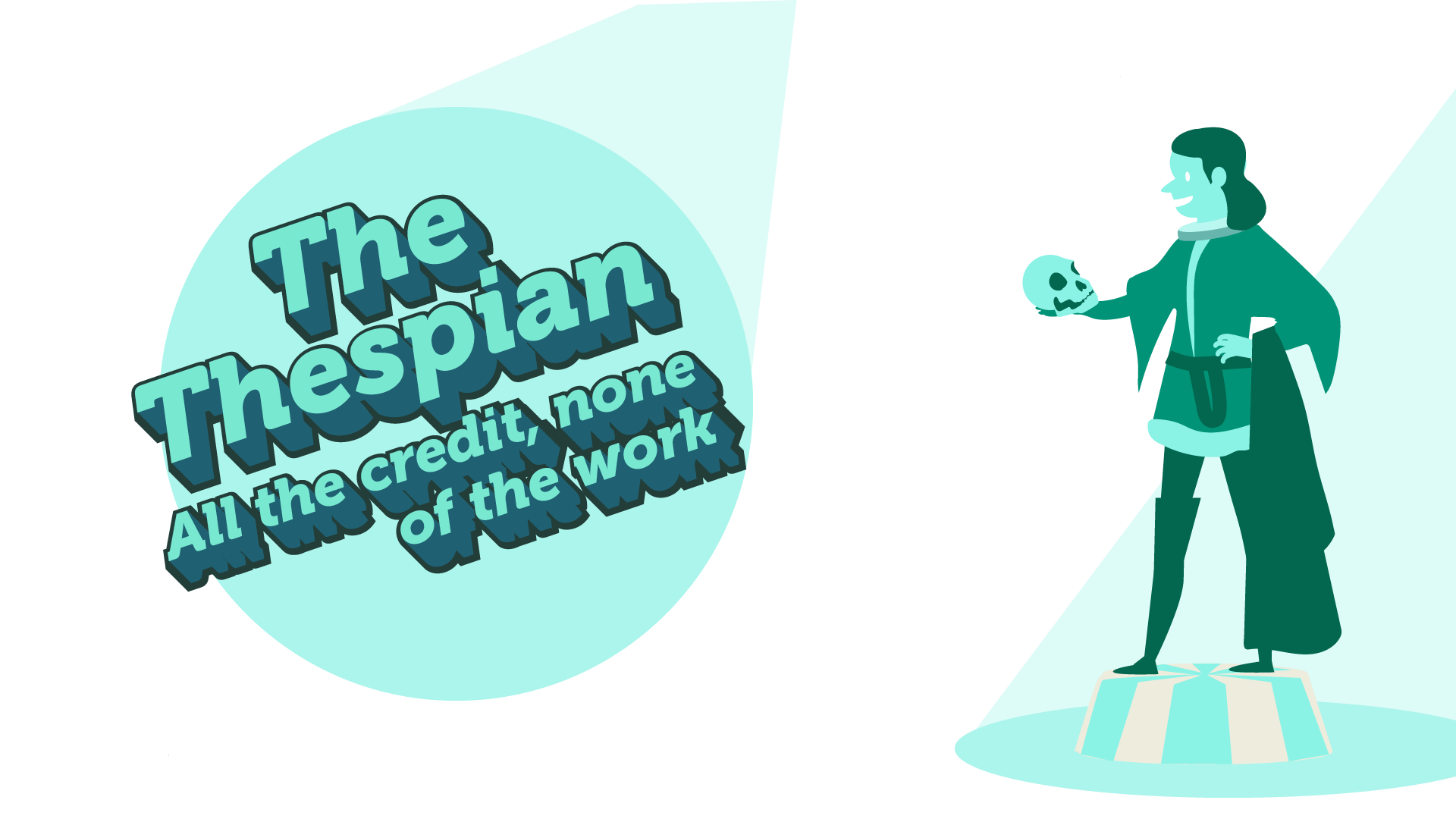 By nature of their role, the thespians are hard to identify without proper interrogation. The thespian is a marketing consultant who farms out your work to others, despite leading you to believe that they are completing the work themselves.
By nature of their role, the thespians are hard to identify without proper interrogation. The thespian is a marketing consultant who farms out your work to others, despite leading you to believe that they are completing the work themselves.
The thespian outsources to contractors with less experience, while they take a nice big slice of the profits.
The problem? You have absolutely no idea who is doing the work you’ve requested. Marketing consultants who take the thespian approach can be very cagey about the fact that they are outsourcing your work. Though they are unlikely to lie if asked directly, they won’t proffer the information willingly.
A limited amount of outsourcing may not be cause for concern. Particularly if it is being used to supplement expertise in some small way, improve efficiency, or reduce costs. For example, trustworthy and effective marketing consultants may outsource minimal amounts of work to keep their prices reasonable.
However, if a marketing consultant is outsourcing heavily, this means that you are effectively paying a premium to a middle-man for sourcing the contractors—so that he or she can take their cut of profit. This is poor value and can create communication issues. Not to mention, you can never be fully certain who you’re working with.
This way of working also incentivises marketing consultants to outsource to cheap, unreliable companies, because doing so increases their profit margin.
The thespian’s way of working can be especially problematic in particular areas of marketing. For instance, search engine optimisation (SEO), where a marketing consultant might pay a third-party to do on-page SEO or backlinking. Outsourced work of this nature is often spammy, short-termist, and lacks direction.
Is This Type of Consultant Right For You?
As already mentioned, minimal outsourcing isn’t necessarily a concern. Heavy outsourcing, on the other hand, can be concerning—especially if you aren’t aware that it is happening. Because of this, the thespian isn’t particularly well suited to any business.
Identifying This Type of Consultant
In the case of the thespian marketing consultant, you will want to ask questions geared towards revealing red flags, so that you can avoid this type of marketing consultant.
Fortunately, when asked directly, most thespian marketing consultants usually admit whether or not they are outsourcing.
Ask the following questions to discover the extent of their outsourcing:
Are you outsourcing?
The answer to this is likely to be “yes”. Most marketing consultants will outsource from time to time to supplement expertise.
How much are you outsourcing?
This is the key question. A thespian marketing consultant is likely to be a bit cagey or evasive in their response. If this is the case, follow up with the question below.
What specific areas are you outsourcing?
If they are vague, this is a red flag. Ask for specifics. For extra accountability, we recommend asking them to send you a written list in the form of an email.
Where relevant, we would also recommend you ask for evidence that the outsourcing isn’t going to cause any issues. For example, if they outsource backlinking, then you should ask how it works and request examples of the backlinks they have created for other clients.
What we are trying to do here is gain insight into the following:
- How much knowledge and experience they have of the process they are outsourcing
- How much confidence they have in their outsourced support
- Whether or not this outsourcing process has been tried and tested before
- How this marketing consultant compares to others (i.e., are they cheaper but outsource more than other marketing consultants). This will give you an understanding of how outsourcing activities impact cost
What in-house staff do you have and what are their areas of expertise?
This question is only relevant if you are speaking to a consultancy or agency, rather than an individual marketing consultant. If the in-house team covers the marketing areas you need support in, then they are unlikely to outsource your work.
As a general rule, the cheaper the cost, the more likely it is that a service is being outsourced abroad. This is especially true for areas such as SEO, website development and Google Ads.
The Snake Oil Salesman
Too good to be true.
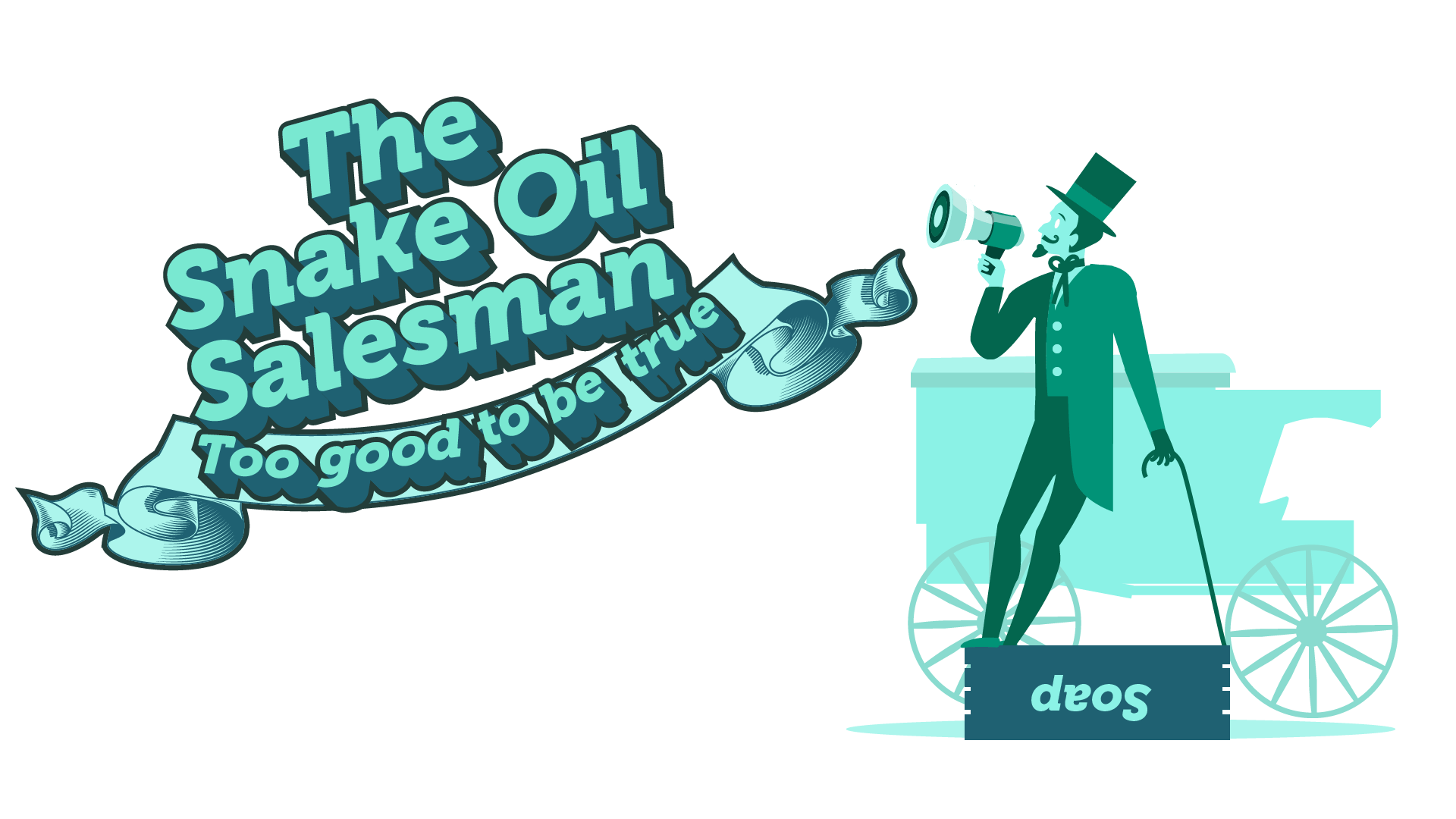 The snake oil salesman is not only found in the marketing industry, but across all industries.
The snake oil salesman is not only found in the marketing industry, but across all industries.
This type of marketing consultant is characterised primarily by a lot of front, but a lack of long-term experience.
The snake oil salesman tends to use pushy sales tactics, while making promises that seem a little too good to be true. In these cases, they usually are.
Snake oil salesmen gloss over the complexities, give shallow advice, and avoid challenging questions that stand a chance of exposing their lack of expertise.
More often than not, the snake oil salesman marketing consultant will promise quick wins that inevitably fail to deliver the promised results.
Is This Type of Consultant Right For You?
This approach isn’t right for anyone, because it is inauthentic and rife with empty promises. If you’re looking for someone you can trust and put stock in, avoid snake oil salesmen like the plague. Of all of the different types of marketing consultants out there, the snake oil salesman should be avoided at all costs.
Identifying This Type of Consultant
Fortunately, snake oil salesmen are reasonably easy to spot—when you know what you’re looking for and how to figure them out.
If you find that a marketing consultant you’re considering is being vague about the practical elements of their approach, are evading questions or giving shallow answers, then it’s likely that they could be the snake oil salesman type.
Here are some the questions you can ask to help you identify a snake oil salesman:
Can you explain, in clear terms, how you would approach helping me market my business?
An experienced and effective marketing consultant will be able to explain to you their processes.
You are looking for detail; end-to-end detail without the waffle. You want to be able to understand exactly what the plan is, how it works and why it is relevant to your business.
Can I see some case studies with evidence of your past success?
A legitimate marketing consultant will be able to provide concrete evidence of their success and experience.
If they do provide case studies, it’s always worth contacting their previous clients to ask if they would recommend them.
Be sure to also review their online testimonials and remember that reviews on their website may not be entirely reliable.
Can you show me where your processes have gone wrong / mistakes you have made?
People and businesses naturally like to focus on the positives, particularly when they’re trying to make a sale. But asking about the negatives is often a more revealing way of gaining an understanding of how a marketing consultant thinks and has developed their thinking over time.
Though it may sound harsh, we always assume that anyone claiming not to have failed in the past is hiding something. We think the failures often reveal more than the successes.
Keep in mind that most businesses pay for experienced marketing support to avoid making costly mistakes. These mistakes are par for the course when you’re new to marketing; experienced consultants have adopted the risk associated with these mistakes by having hammered them out in the early years of their business.
Types of Marketing Consultants That Might Be Right For You
Some of the following types of marketing consultants will be completely wrong for you, while others will be far better suited. Let’s begin with the guide.
The Guide
Two heads are better than one.

Also known as the collaborative marketing consultant.
Marketing consultants and marketing consultancies that are true to their title should work collaboratively, in partnership.
The collaborative way of working requires a consultant to truly listen to their client. The consultant should have no predetermined ideas about what they are going to do for their client—rather, they will adapt their strategy to suit the business’ unique circumstances and goals.
Ultimately, collaborative marketing consultants are there to advise, encourage, and provide expert insights. They should not make decisions unilaterally and the final call will always be yours.
Though honest and forthright, a collaborative marketing consultant will not place undue pressure on you. And they won’t pressure you to take a certain route, however convinced of that route they may be. You can expect them to make you aware of the risks of alternative routes, but not to dominate the decision-making process.
Is This Type of Consultant Right For You?
A collaborative marketing consultant is there to guide you and is the most faithful to the definition of consultancy. But that doesn’t mean that this is the right type of consultant for you, as a business leader.
There are many other types of marketing consultants that deviate from the strict definition of consultancy. Consultants which do so may be better suited to those who want less involvement in the process or perhaps would prefer not to be advised at all.
The guide marketing consultant will work with you, not for you, and is ideal for clients who want guidance, support—and who are willing to develop a working relationship with their consultant that is strong, long-term, and collaborative by nature.
Identifying This Type of Consultant
If you believe that the guide approach is best suited to your business, you are faced with the challenge of determining whether or not a marketing consultant works in this way.
Though many claim to be collaborative, in practice some consultancies are unwilling to take the time to understand your business. In fact, the time, sincerity and depth a marketing consultant is willing to provide, especially in the initial stages, is often the smartest way to identify whether you are working with a guide.
It’s easy to mistake certain marketing consultants for being a “guide” because they appear to put a lot of thought into their proposed strategies. However, you may want to avoid consultants who are all about the thinking process, but prefer to have very little to do with application and execution.
While this type of marketing consultant can give plenty of clever, often generic advice, they fail when it comes to applying this advice. Especially to non-generic businesses that are completely digitally focused.
Working with a marketing consultant is a significant investment. Which is why we always advise businesses to conduct an interview of sorts before making their choice.
You should also take your time when choosing; remember that time and thoroughness are your friend when making your final choice. A good guide shouldn’t be pushing you; they should be working with you.
To separate the real guides from the other types of marketing consultants, ask the following questions:
Can I see case studies with evidence of the campaigns you’ve run?
A genuine guide will be able to show you plenty of evidence of their experience in application and execution. This proves that they aren’t simply thinkers, but doers. This is crucial, because marketing consultants who are experienced in application have taken on much of the application risks on your behalf by fine tuning their approach over the years.
Tell me about you, your background and your learning?
We think that a good marketing consultant should have a logical end-to-end story of how they developed their current marketing methodology.
You should be able to see a common thread between the steps they’ve taken, the experiences they’ve had, and their thinking.
The way they arrived at their current systems and processes should make sense; there shouldn’t be any gaps or unexplained changes in their approach.
How often will I hear from you?
Ideally, you should have ongoing contact in the form of email, phone calls, video calls, or face-to-face meetings. The guide marketing consultant will set aside significant amounts of time for these meetings, and they should be scheduled regularly. How much time and how regularly is for you to decide.
How long will it take you to truly understand my business?
In their answer, the guide marketing consultant will probably explain their onboarding process. They may say that they will schedule lengthy meetings in the early stages of your working relationship, or they may ask you to answer lots of questions about your business. An especially astute marketing consultant will constantly challenge your thinking, your marketing and your business.
What happens if I disagree with your advice?
The guide will make it clear that you have the final say in all decisions, but will be candid about the implications and risks associated with any route you decide to take.
Though the answers to these questions will inevitably vary from business to business, it is for you to decide whether they speak to the collaborative nature of the marketing consultant, or otherwise.
How long does an average client stay with you and what have you done with them?
Tenure is good; it shows that they have consistency. You want to pull out their story for each client as it will tell you the extent of their involvement and how the campaign changed overtime.
The Big Boss
My word is rule.
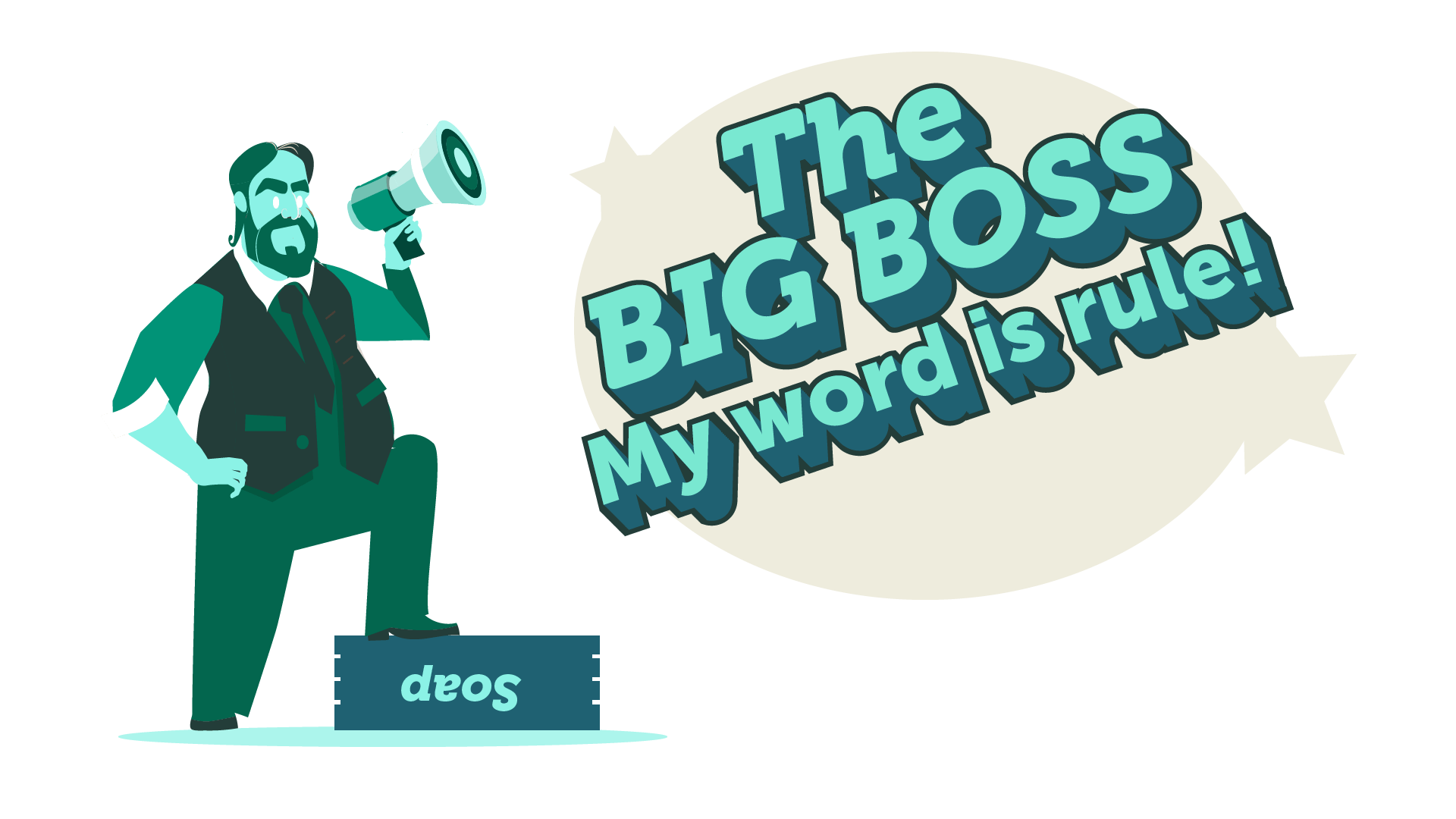
For some, the big boss may feel like exactly what they need.
The big boss is confident, a decision-maker, and dominant—which may seem reassuring. Especially if you’re a business owner who feels overwhelmed by the sheer number of marketing routes available to you. The weight of responsibility can be alleviated by a big boss marketing consultant eager to take the decisions out of your hands.
Big bosses are likely to have hard and fast ideas about your path to success and can be very resistant to any adaptations. But in their approach, they overlook your expertise. You know your business better than anyone and you will have unique goals and ideas about your own identity. When you relinquish the decision-making power to a big boss marketing consultant, you fail to recognise the value and critical nature of your own contribution.
If you’re tempted by the notion of someone relieving you of the pressure of marketing decisions, consider this; a collaborative marketing consultant is also able to relieve you of this pressure, but by encouraging you and helping you grow more confident—not by overlooking your contribution.
Is This Type of Consultant Right For You?
If you are looking for someone with conviction who can relieve you of the responsibility of decision-making, then the big boss (especially in comparison to the other types of marketing consultants), may be right for you. They function similarly to a head of department, often making high-level decisions on your behalf.
However, you should keep in mind that working with this type of marketing consultant requires a lot of trust on your part. And if something goes wrong, your lack of involvement may come back to bite you.
Identifying This Type of Consultant
A key question to ask to help you identify a big boss marketing consultant is:
How much of my time will you need and how involved do I need to be?
A big boss marketing consultant will keep your involvement to a minimum. They will take the lead and are unlikely to schedule long phone calls or meetings. They might send you a weekly or monthly report via email, with updates on their progress and results.
What results have you got in the past?
What you are looking for is trust in the process here. The more evidence you can see of success, the more confident you should feel that you have made a good decision and your business is in the right hands.
The Butler
You say ‘jump’, I say ‘how high’.
 On the other side of the spectrum, we have the butler. Just as the big boss appeals to some, so does the butler. The butler will follow instructions to the letter and is less forthright than the big boss, but no less un-collaborative. While the big boss usurps decisions, the butler relinquishes all responsibility for them.
On the other side of the spectrum, we have the butler. Just as the big boss appeals to some, so does the butler. The butler will follow instructions to the letter and is less forthright than the big boss, but no less un-collaborative. While the big boss usurps decisions, the butler relinquishes all responsibility for them.
The butler approach is common among some marketing agencies and isn’t necessarily a bad thing if this is the type of support you’re looking for. If you have a clear idea of the direction you’d like to head in, and just need someone to do the legwork, then a marketing agency may well be suited to your business’ needs—especially if you already have a marketing strategy in place which is either working, or you are confident it is going to work.
But if you are looking for a marketing consultancy that can help you create a robust and successful marketing strategy, it’s not a butler you need, but a partner. Despite sometimes being called a consultant, the butler does not provide consultancy services. In fact, the butler is better described as a marketing manager hired as a contractor. You will likely pick them up on short-term freelancer websites.
This type of consultant is often hired to supplement existing staff temporarily—but be aware that just because they call themselves “consultants” doesn’t necessarily mean they perform a consultancy role.
If you are wanting a decision maker (which we are assuming is the reason you are reading this guide), be on the lookout for providers that seem more interested in following orders than working in partnership with you to define your strategy.
Is This Type of Consultant Right For You?
If you are looking for someone to outsource certain marketing tasks to and are not especially interested in developing a strategy, then this could be the right type of consultant for you.
In fact, we at Murray Dare often turn away potential clients simply because their needs are better suited to a marketing agency that is set up for implementation, rather than consultancy. There is nothing wrong with this, if that is what you are looking for.
Identifying This Type of Consultant
If you’re looking for a butler, consider asking the following questions:
Can you complete tasks for me as and when needed?
A butler marketing consultant will be able to complete tasks on a reasonably ad hoc basis. If you have specific tasks in mind, you should ask about these.
How much will I hear from you?
A butler will not schedule long meetings or phone calls. Instead, they often collaborate via email to receive their instructions. Because they are set up to follow instructions, rather than advise, the butler requires very little contact in comparison to other types of consultants, such as the guide.
How do we measure success and performance?
If the answer they give to this question is a rundown of tasks and timings, then you will have a marketing consultant with butler tendencies.
The Jack
Jack of all trades, master of none.
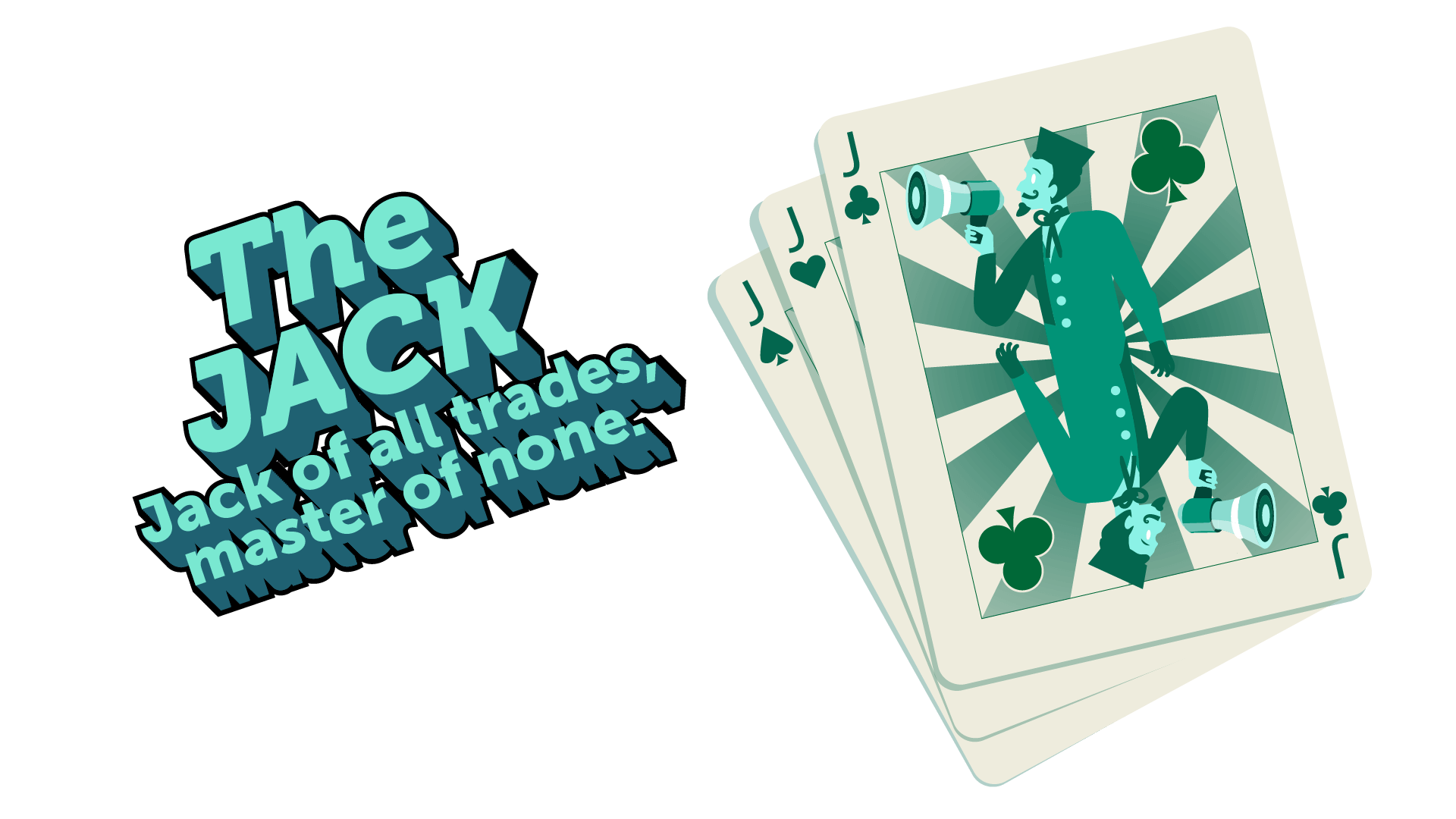 If an individual marketing consultant claims to be an expert in all areas of marketing, they’re probably a Jack of all trades, master of none. They’re looking for any and all business, but it’s extremely unlikely that they can provide the same level of expertise as a specialist marketing consultant.
If an individual marketing consultant claims to be an expert in all areas of marketing, they’re probably a Jack of all trades, master of none. They’re looking for any and all business, but it’s extremely unlikely that they can provide the same level of expertise as a specialist marketing consultant.
It is also highly likely that people who are new to marketing consultancy fall into this bracket. They are essentially generalist marketing managers who are looking to develop their skill set as they work.
As a rule, choose a specialist marketing consultant who can help you tackle the area of marketing you’re struggling most with—whether that’s SEO, email, or strategy.
Find the marketing consultant who has a relevant background to the problems you are trying to solve. Even a Jack may have specialist areas of expertise, if they have paid particular attention to this area in a previous role.
What if you need someone to help you with all areas of your marketing?
It depends on your situation, but we would argue that no one is amazing at everything, especially those who tell you they are. If you are looking for a company that can assist you with all areas of marketing, we suggest choosing a marketing consultancy with a varied team of specialists.
The best teams are compiled of experts who work together, each with a very specific role to play. They are masters of their trade, they know their strengths, and they know their limitations.
A jack of all trades is learning to cut their teeth, before they work out what they are really good at.
Is This Type of Consultant Right For You?
A Jack of all trades might be right for you if you aren’t looking for specialist support and you’d like to have a single point of contact for all marketing support.
The Jack marketing consultant is often new to consultancy. They may have worked for a consultancy in the past, and have just recently struck out on their own. They are also usually more budget-friendly than other types of marketing consultants.
It is important to note, however, that a Jack of all trades won’t be able to support you in specialist areas of marketing, though they may agree to assist in this regard if asked. This can result in low-quality work. So if you are set on working with a Jack, make sure the work you give them is aligned with their level of expertise.
Identifying This Type of Consultant
The Jack is fairly easy to spot. They will usually be an individual who claims to be able to help with all areas of marketing. To identify a Jack of all trades, ask the following question:
Is there anything you can’t do for me?
Whether you’re trying to find a Jack marketing consultant or hoping to avoid them, this is a great question to ask. A Jack will offer to conduct almost all marketing work for you, often despite lacking sufficient experience.
What have you got wrong in the past?
History is the best predictor of the future. Experienced marketing consultants will have become experienced by making mistakes. They should be able to own these mistakes and tell you what they have learnt from them.
The Odds Man
Playing the numbers game.
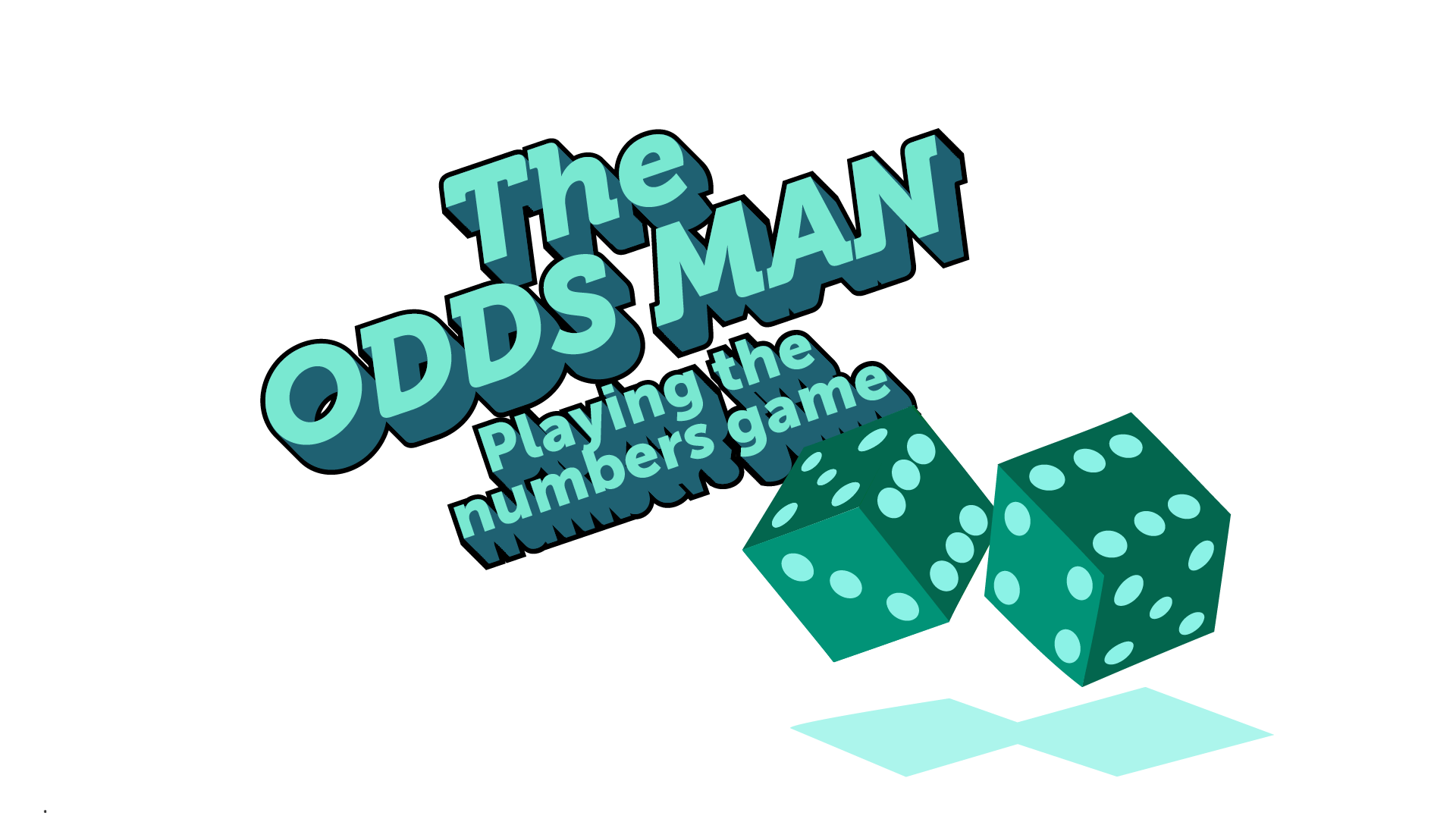 If you’re looking for quantity over quality, then the odds man may be suited to your business. The odds man plays the numbers game, typically by providing as much as possible within a short timeframe.
If you’re looking for quantity over quality, then the odds man may be suited to your business. The odds man plays the numbers game, typically by providing as much as possible within a short timeframe.
For example, when conducting outreach and PR, the odds man marketing consultant will send out bulk emails, source numerous irrelevant guest blog opportunities, and quickly land themselves in spam folders. They are likely to disregard the personal touch that makes for great outreach.
Similarly, in content, the odds man will stuff keywords and aim for high word count, instead of high-quality—compromising the likelihood of genuine audience engagement.
Ultimately, the odds man aims to flood the marketplace with your business’ presence, failing to recognise that quantity must be balanced with quality for true visibility and conversion.
Is This Type of Consultant Right For You?
Unlike many other types of marketing consultants, the odds man focuses on visibility, not engagement. If being as visible as possible as quickly as possible is your priority, then you might consider the odds man approach.
The drawback of the odds man is that the content produced tends to be lower quality. For example, clients of an odds man marketing consultant might wind up with blog or website content that doesn’t read well or convert effectively.
Because this type of marketing consultant takes a spammy approach, your IP rating may be damaged, meaning all your emails go to spam. Alternatively, you might be chasing leads that don’t really exist.
Identifying This Type of Consultant
The questions you ask to identify an odds man marketing consultant will vary depending on what the consultant has been hired to do for you. Here are some generic questions you can ask to help you identify whether a marketing consultant plays the numbers game:
How much time will you spend on a specific task? (e.g. creating a blog post)
You should tweak this question to address a specific task you might ask the consultant to complete for you. If you’re not sure how long something of high quality should take, do a little research. If they are promising to do it faster, they are likely to be an odds man marketing consultant.
What are the expected results?
An odds man marketing consultant is unlikely to be able to give you a clear idea of what results you should expect (i.e., number of sales). This is because their strategy isn’t data-led, which means the results are very difficult to predict.
What is the review process?
The odds man won’t put much time or effort into the review process for completed tasks, because their focus is on quantity not quality.
The Fashionista
Big on trends, bad on data.
 Lastly, we have the fashionista. The fashionista is less interested in data insights or tailored strategies. They follow the latest trends in marketing—of which there are many—falling victim to claims like “email marketing is the only way to succeed” and “SEO is all that matters”.
Lastly, we have the fashionista. The fashionista is less interested in data insights or tailored strategies. They follow the latest trends in marketing—of which there are many—falling victim to claims like “email marketing is the only way to succeed” and “SEO is all that matters”.
The fashionista marketing consultant often lacks a strategic focus, and prefers to lean on current trends and fads.
That being said, they can be great if the route is tried and tested. Especially if they are performing tasks for you that they have had success with for similar clients in the past.
We find social media experts often tend to land in this category. And this approach makes sense within that context as it sometimes requires a less structured approach than other areas of digital marketing.
Context is important here. If social media works for your business and you have found the right person, then go for it.
Is This Type of Consultant Right For You?
Fashionista marketing consultants tend to be very good at specific areas of marketing, particularly within certain industries. For instance, a fashionista preoccupied with the email marketing trend who has had a lot of success while working with a clothing brand might well be able to deliver similar levels of email marketing success for a business in the same sector.
However, fashionista marketing consultants aren’t especially adaptable and what works for one business won’t necessarily work for another.
Identifying This Type of Marketing Consultant
To identify the fashionista approach, ask the following question:
Why do you think (insert trend / specific area of marketing) is right for my company?
If they answer that the specific area of marketing works for almost every company, so yours should be no different, they are probably a fashionista marketing consultant.
The Right Type of Marketing Consultant is the One That Works For You
This guide wasn’t written to be prescriptive or to lead every reader down the same route. Every business owner reading this guide will have his or her own unique way of working and a specific preference for how their marketing support functions.
What we have found, however, is that many business owners either don’t know what options are available to them or don’t know how to identify red flags when talking to different types of marketing consultants.
We hope that this chapter has given you some insight into the types of marketing consultants out there, and that it has helped clarify what questions you can ask to suss out who you’re dealing with.
But questions of character aren’t the only questions business owners should be asking when choosing the right marketing consultant for their needs. Their way of working is another crucial consideration, which we will explore in the next chapter.
Next chapter:
The Different Marketing Consultant Approaches
